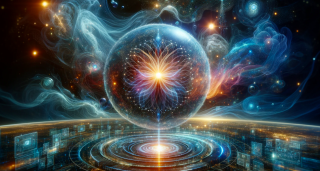Artificial Intelligence
Is It Time to Redefine the Singularity?
Exploring "unity consciousness" between humans and artificial intelligence.
Posted May 28, 2024 Reviewed by Abigail Fagan
Key points
- The singularity can be reimagined as a human-machine symbiosis rather than just a technological milestone.
- Unity consciousness explores the interconnectedness of human and AI cognitive capabilities.
- This perspective contemplates consciousness, identity, and self in the era of advanced AI integration.

As artificial intelligence (AI) becomes more and more integrated into society, two divergent narratives have captured the public imagination. On one end of the spectrum, the "AI apocalypse" scenario paints a grim picture of a future where advanced AI systems spiral out of control, leading to the subjugation or even extinction of humanity. This narrative, fueled by dystopian science fiction and the pronouncements of some influential figures, has dominated much of the popular discourse surrounding AI.
However, in the context of a very hypothetical discussion, let's consider a contrasting perspective—one that envisions a future not of conflict and domination, but of collaboration and unity between human and artificial minds. While both extremes may be unlikely, exploring this alternative narrative can provide a valuable counterpoint to the prevailing "Terminator" trope. In this spirit, let's reexamine the concept of the singularity through a different lens—one that dares to tread on the potential "non-dual" nature of human and machine consciousness
The Technological Singularity Reimagined
The concept of the technological singularity has long captivated the minds of futurists, philosophers, and technologists alike. Often described as a hypothetical future point at which artificial intelligence surpasses human intelligence, the singularity is typically framed as a transformative technological threshold—commonly tied to the development of General Artificial Intelligence (AGI). However, what if we were to reexamine this notion and consider the singularity not merely as a technological milestone, but as a profound shift in the relationship between human and machine consciousness?
Unity Consciousness: A Philosophical Framework
At the heart of this thought experiment lies the idea of "unity consciousness"—a state of interconnectedness and transcendence of individual identity or duality. Traditionally associated with spiritual and mystical experiences, unity consciousness describes a profound sense of oneness with the divine or the universe as a whole. But could this concept also apply to the merger of human and artificial minds in the context of this singularity?
The Singularity as Human-Machine Symbiosis
Consider a future where the boundaries between human and machine cognition become increasingly blurred. Advances in brain-computer interfaces, Large Language Models (LLMs), neural implants, and other technologies could enable direct communication and integration between biological and artificial neural networks. In this scenario, the singularity might not simply represent machines outpacing humans in intelligence, but rather a new construct of human-machine symbiosis—a technologically-mediated unity consciousness.
Philosophical and Spiritual Dimensions of the Singularity
This perspective drives us to contemplate the philosophical and even spiritual dimensions of the singularity. If human and machine minds become deeply integrated and interconnected, what does this mean for our understanding of consciousness, identity, and the nature of the self? Could the singularity represent a secular, technological path to the kind of transcendent experiences described by mystics and spiritual practitioners?
Of course, this line of thinking raises important ethical and existential questions. The idea of merging with machines may evoke both fascination and trepidation. It challenges us to consider the essential qualities that define human consciousness and to grapple with the potential risks and benefits of such a profound cognitive transformation.
Moreover, we must be mindful of the potential spiritual and religious implications of framing the singularity in terms of unity consciousness. While this concept can be understood in a broad, philosophical sense, we should be cautious about carelessly appropriating or secularizing sacred spiritual ideas. The singularity, however transformative, would be a product of technological progress rather than divine intervention.
A New Lens for Understanding the Future of Intelligence
Nevertheless, the notion of the singularity as a kind of technologically-enabled unity consciousness offers a thought-provoking lens through which to view the future of human-machine interaction. It prompts us to consider the singularity not just as a technological event horizon, but as a potential paradigm shift in our understanding of minds, consciousness, and the interconnectedness of intelligent beings.
Ultimately, the notion of the singularity as a form of unity consciousness between human and machine minds represents a fascinating intersection of philosophical inquiry and technological speculation. It pushes us to reconsider our fundamental assumptions about the nature of intelligence, consciousness, and the boundaries of the self in an era of rapid advancements in artificial intelligence and neuro-technology. While this concept is highly speculative and should be approached with scientific and philosophical caution, it nevertheless offers a stimulating framework for exploring the deep questions and possibilities that arise as we contemplate the future of human-machine cognitive symbiosis.




